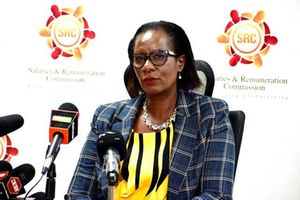Deaf and denied: Rape victim's struggle for justice in Kisumu

A rape victim from Mamboleo, Kisumu.
What you need to know:
- Sissy* was raped and went to a nearby hospital and sat there for hours. No one could understand her. She only used signs to communicate.
- The health professionals tried to communicate with her through writing in English and Kiswahili, but that failed to work as she could not read or write.
Last March Sissy* was raped in her house at Mamboleo, a low-income settlement in Kisumu County, by a man to known to her.
The 25-year-old went to a nearby hospital and sat there for hours. Why? No one could understand her. She only used signs to communicate. Sissy cannot hear. And worst still, she never went to school.
The health professionals tried to communicate with her through writing in English and Kiswahili, but that failed to work as she cannot read or write. They made attempts in Dholuo. That failed, too.
They gave up. Sissy didn’t. She sat on the waiting bench. Those who came after her got served and left. One of the nurses doing the rounds at the hospital got concerned with the long hours she had been waiting to be seen.
She started engaging her, unaware she was deaf. Unlike her colleagues, she was patient. She used the “traditional signs” – the general signs learnt through interaction, to establish her need for treatment.
This traditional sign language led to her examination hours later, after which the nurse referred her to the nearest police station.
Here, the police officers could not record the violation against her, as they did not understand what she was saying through signs, and neither could she write nor read.
Having had too much of not being understood at the hospital and at the police station, Sissy gave up on reporting the rape, yet she deserves justice for the crime committed against her.
“The deaf feel like they are not wanted when they go through these experiences,” says Lydia Digo, the founder of Elite Deaf, a community-based organisation advocating the rights of the deaf in Kisumu East.
Lydia advocates training of health professionals and police officers in sign language to remove the barrier of discrimination when seeking treatment and reporting crimes committed against them.
“Trust is important when handling the deaf. They must trust you enough to share with you whatever is troubling them. That applies to police officers and nurses or doctors,” she says.
“Let’s prioritise the rights of the deaf in delivery of all services. They are equal human beings.”
*The name of the victim has been changed to protect her identity.





